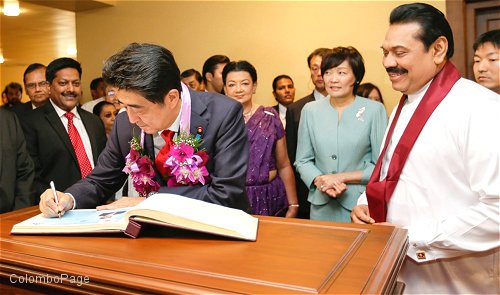 Photograph: ColomboPage |
Japan's Prime Minister Shinzo Abe has strengthened ties with Sri Lanka, as the two governments signed several agreements during his visit to the island.
Japan agreed to loan Sri Lanka US $330 million to help develop a new terminal at Colombo’s international airport, as well as signing agreements related to trade and agriculture.
Abe also called for Sri Lanka to “dispel concerns indicated in the resolution by the UN Human Rights Council” in an interview prior to his visit, going on to call for “further efforts” to implement recommendations from the Lessons Learnt and Reconciliation Commission (LLRC).
The Japanese Prime Minister met with Sri Lankan President Mahinda Rajapaksa as part of a tour across South Asia, after visiting Bangladesh on Saturday.
"The president and I also reconfirmed the importance of Sri Lanka's national reconciliation after the conflict and engagement with the international community," said Abe after the meeting.
Japan continues to be Sri Lanka's largest donor of foreign aid and chose to abstain at the UN Human Rights Council in March, when a resolution calling for an investigation into war crimes in Sri Lanka was passed.
Rajapaksa stated his appreciation for Japan's support after the meeting, adding,
“It is regretted that certain external entities are refusing to acknowledge the significant progress made by Sri Lanka towards further consolidating peace and reconciliation. At a time when Sri Lanka is facing many challenges, I wish to acknowledge and express my sincere appreciation to Japan for the support, understanding, solidarity and friendship extended to Sri Lanka and its people.”
The two governments released a joint statement outlining the agreements signed, adding that,
“Acknowledging that peace and stability are the desire of all people, the two leaders reaffirmed the importance of national reconciliation for the ever-lasting peace in Sri Lanka, a multi- ethnic and multi-religious country.”
The statement also said that Prime Minister Abe “also highly appreciated the specific actions such as holding the election of the Northern Provincial Council in September 2013” and that he,
“welcomed the continuing engagement of the Government of Sri Lanka, in particular with the Human Rights Council and its mechanisms, and the Office of the High Commissioner for Human Rights (OHCHR), and its willingness to conduct high-level dialogues with the UN High Commissioner for Human Rights and the invitation extended to him to visit Sri Lanka during 2014.”
The joint statement went on to say that Abe “appreciated the political leadership of President Rajapaksa towards national reconciliation”.
See the full joint statement here.
